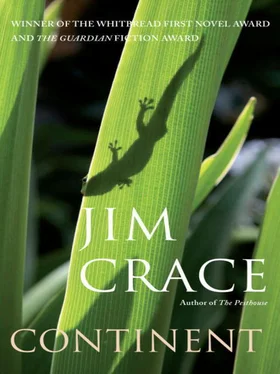’Isra did not turn to look behind, to see the schoolteacher running along the flat floor of the valley. It was bad luck to look behind. He fixed his eye on the summit of the ridge and rode happily, knowing that he was leading and that the schoolteacher, wherever he was, was behind. But he was careful not to tire his horse. She must be fresh enough to finish strongly, like a victor. ‘Let the horse be slow enough to step firmly,’ he told himself, ‘but fast enough to arrive in time, like when I rode across the mountains to bring the helicopter to the mayor.’ ’Isra reached the flat ledge of soily stone a few yards below the summit of the ridge where he had to turn the horse through a tight passage of rock to take the track to the top. The horse paused for a footing and ’Isra let himself glance at the track below. No sign of the teacher. Perhaps he was running in one of the deep gulleys and would appear in a moment. He listened. No, not a sound. He would have heard the slapping soles of the foreigner’s shoes if he had been moving on that hillside, but not a sound and not a sign.
’Isra looked along the ridge to either side, fearing that the teacher had taken a new, quicker route. Still no movement. ’Isra laughed. ‘He is resting,’ he said aloud, to the horse and the hills. ‘He is tired and he is resting. We have won this race.’ He spurred the horse up the last few metres of track and let himself enjoy both the pleasure of reaching the top and of having won midway through the race.
‘He is resting,’ he thought. ‘Or perhaps he has fallen and is lying in the stones with his ankles twisted. We will send a horse to bring him down. I myself will ride to bring him down on the back of my horse.’
And when ’Isra, the rider of the village, reached the summit of the ridge he was laughing to himself.
At the village store old Loti and the villagers were waiting, their eyes crannied against the evening light silhouetting the hills before them. Loti and the old men knew which spot on the ridge to watch, the spot where the teacher had crossed each evening. They knew where the leader of the race would appear briefly before disappearing into the slip of an erosion gulley and then come in view again, lower down the hill where the track flattened. And though the villagers were watching the ridge too, it was their ears which were nervous, waiting for the old men to cry out ‘Here he comes. It is…’ and then the name of the man who led. They formed the two possible shapes on the still ridge, the runner or the horse, its tail frisky with victory.
And then Loti called, just one word, ’Isra, and they saw him there, the man of their village, winning on the ridge. A cry went up from the villagers, carrying across the evening to ’Isra. They saw him spur his horse and start to descend the track into the deep gulley, ferociously. ‘He should stay calm,’ the old men thought. ‘He is in the lead.’ But they did not know what ’Isra had seen jogging along the dry valley floor firmly and resolutely towards the village and the store. The schoolteacher had taken the long valley route and was running strongly on the obstacle-free road while he, ’Isra-kone, had still to take care amongst the treacherous descents, though he and his horse were nearer, much nearer, to the store.
’Isra’s descent brought him to the valley track twenty metres ahead of the schoolteacher. He lost a metre only turning the horse onto it and urging her to the new course. But the last scrambled descent from the ridge after ’Isra had spotted the schoolteacher had unnerved her and she settled badly. Eddy Rivette, however, had not changed his pace. He had kept his steady step from the moment that he had decided not to challenge ’Isra on the ridge route but follow the contours of the valley. His steadiness kept him behind the horse and he knew from experience that the race depended on the sprint. But when and how? A fast one now to take the lead and keep it with stamina? Or leave it till the end and take it at the post? Or split it in two? Two half sprints — the first to worry the horse and the rider, the second to pass them. Yes, by far the best tactic and the safest one, not taking things too early or leaving them too late. Eddy Rivette went forward on his toes and opened his pace. He closed the gap between him and the horse but it had tired him and he was glad to tuck in behind ’Isra and let the animal do the work for the fifty metres before the final bend at the single tree towards the store. He had meant it as half his sprint but he realized that he had no more race in him, that that sprint was all that was left and that now, at best, he could hang on behind the horse, drawn in to her flanks, and come in level at least with the horse’s tail though a saddle’s length behind ’Isra. Eddy Rivette knew the race for him was lost, but ’Isra did not know it was won. The sight of the schoolteacher easing across the flat valley had worried him but he had thought he was safe when he reached the track, ahead. But the schoolteacher had closed that gap in moments and with the speed of a young dog and was pressing him close, running at the horse’s speed and drawing tighter and tighter into the movement of the mare. They must go faster, faster, before the teacher ran like that again and ate up the metres and ’Isra’s fame in the village. His knees were sharp in the horse’s side and his toes were fierce. Go, horse, he said, go go. And he was fierce with the white mare, nagging her across those last few metres. The schoolteacher, with hardly a breath finding space in his lungs, hung on in the wake of warm air between the animal and its dust.
And then Eddy Rivette heard something new: a rasp in the horse’s lungs that told him ’Isra was driving her too harshly and that, maybe, if only he could stay the pace of that gallop, the horse would have to slow sometime.
Both men heard both lungs racking, the runner and the horse both wanting the race over so that they could halt the pounding and gasp in air and air and normalize their hearts and lungs and shocked legs. No distance now. Just the turn and the few metres to the villagers at the store.
Eddy Rivette’s lungs gave. He slowed and stooped a little, his hand on his chest below his heart, the pain building up, the horse moving ahead. He would finish. He was professional enough to finish and he was strong enough to recover quickly. But he would finish last, second to ’Isra and his horse, and that good race would be run.
Horse and ’Isra were at the last bend, taking it with panic and joy, not sure but sure enough that in a moment there would be cheers and the cheers would be theirs. ’Isra glimpsed the flagging schoolteacher a metre and a half behind, half caught up in the hoof dust. He leant with his horse into the bend at the tree and urged her into it, leaning far out like a yachtsman as pivot to the bend. The white mare was upright and tired, taking the turn as best she could. She felt her rider’s weight shift towards the tree and went with it, too tired to resist. Her body came down. Her feet went away. She hit the dust of the track with her shoulder, the rest of her body bunched behind, hoofing the air, and sliding for a moment, doing the real damage to her tired white shoulder and to the man’s thin leg on which she had fallen.
Not a whinny from her, too tired and breathless. Not a cry from ’Isra, too shamed already. One small gasp from the teacher, a cry of victory suppressed through experience until the line was crossed. A great whoop from the villagers, from the cackle of Loti to the yelp of the schoolchildren, as the winner of the race crossed the line of shadow marked at the side of the store by a low and sinking sun.
I
Читать дальше












